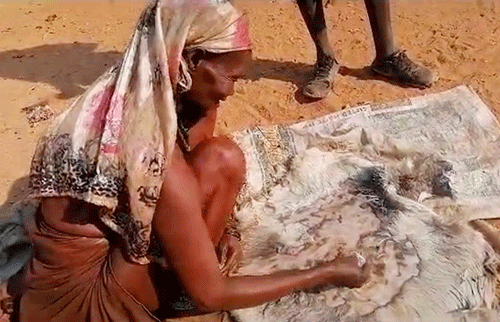Hunger and poverty have pushed a destitute Ovatjimba family in Otjikojo, a village some 25km west of Okangwati in the Kunene region, into scavenging for goat skins to feed themselves.
The Ovatjimba are one of the marginalised groups in Namibia.
Their plight is contained in a series of widely circulated video clips.
So dire is their situation that they now feed on animal skin they get from neighbours after a rare slaughter.
An Omutjimba woman, Taree Muhenje of Otjikojo, registers her dismay, saying the government has abandoned the Ovatjimba community who have now been left to fend for themselves.
“I am removing the fur from the skin and putting it [skin] in the pot and cooking it. Now this is what you call being abandoned. Who eats goat skin? It’s not filling but at least there is something in the stomach,” she stated as she continues peeling the skin.
Another woman, Mukaasiripi Tjambiru says they are between a rock and a hard place in a world filled with hunger as they are denied food from existing feeding schemes and safety nets.
“We don’t receive food and I don’t have identity documents. My child has [health] problems and I don’t even have money for him for treatment,” said Tjambiru in a recent video obtained by New Era.
Tukauharapi Mbindura is in a similar dire situation.
“I am dying of hunger here. I see some people receive food through the feeding scheme but I just watch as the government has abandoned some of us. We used to live well, we used to get tins and sacks of food; we were living large but now, nothing is done to assist us Ovatjimba,” stated Mbindura who at least gets a monthly grant.
Assessing
This paper reached out to Kunene’s political head, governor Marius Sheya, who said he saw the clip under discussion on the New Era social media sites and was assessing the issue.
“We are dealing with it as we speak,” said Sheya, who further promised to revert to this publication on the necessary steps the authority will take.
Meanwhile, deputy minister of marginalised people Royal /Ui/o/oo, who is accused of skewed distribution of resources to the different marginalised communities, said his hands are tied. He attributed the change in management to some of the hurdles limiting his office from addressing issues around members he is bound to serve.
/Ui/o/oo also told New Era that under the Office of the President, he operated more independently but the tables turned when the portfolio became a department under the Office of the Vice President, ultimately falling under the gender ministry.
“Even though there were challenges here and there under the Office of the President, I worked independently and was a little advanced. But after they removed my colleague and I, we were put under gender,” he said.
He added: “I thought, maybe because I am dealing with a special programme, targeting the marginalised, I will receive more attention than other deputy ministers and that is not the case,” he stated.
/Ui/o/oo said he is also affected as a person coming from one of the marginalised groups, operating in 11 regions.
“My hands are cut off in the sense that there is no transport so what else can one do? The division needs to be saved. How much of the budget is given to the marginalised community? It is the obligation of my government to take care of our people,” said /Ui/o/oo.
Presidential intervention
He called on President Hage Geingob to intervene in the structure and robustly address issues around the marginalised.
“The way forward is that my government should listen to me. The President must intervene and give directives, including the Prime Minister [Saara Kuugongelwa-Amadhila], and Vice President [Nangolo Mbumba]. They must come and listen to our pleas. There are a lot of stumbling blocks in the way.”
/Ui/o/oo pointed out that what is meant for the marginalised must enrich the marginalised and there must be no middleman in between.
He then pointed to the alleged mistreatment of marginalised communities by the government in the Zambezi region.
“I am not going to hide this one. This is the unfair treatment we are receiving from our government. I am not going to beat around the bush,” he stated, referring to the !Khoe people whose cattle were allegedly confiscated by government.
Ombudsman
Like /Ui/o/oo, it is ombudsman Basilius Dyakugha’s position that the issue of hunger and poverty is a humanitarian issue and the sole responsibility of the government to assist vulnerable groups.
“The role of government is to look after its citizens and this is where the concept of humanitarian assistance comes in to make sure that as a State, you provide much-needed assistance to the vulnerable groups. The aspect of assisting the poor to not die from hunger is on humanitarian grounds,” the country’s top human rights protector said.
Dyakugha added that it is the primary role of government to ensure that no citizen dies of hunger because the constitution states that all the resources in Namibia belong to the State and the State is the people, “so how can the owners of the resources die of hunger?”
Budget
Finance minister Iipumbu Shiimi distributed N$6.5 billion for the 2023/24 financial year to the gender ministry under which the marginalised communities falls, an increase from N$5.5 billion the previous financial year.


